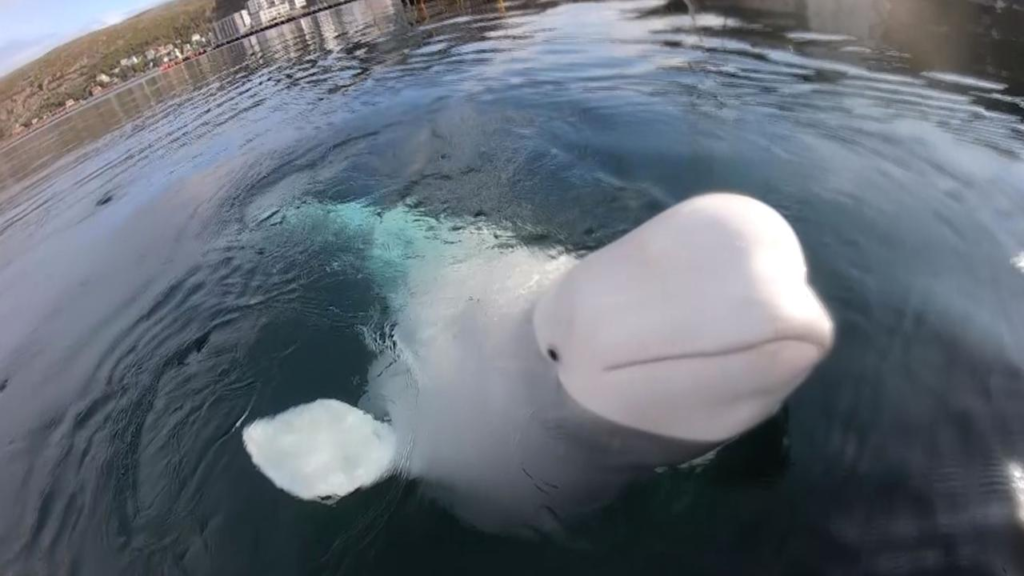Russian spy whale Hvaldimir, a 14-foot-long beluga whale, was recently found dead in Norway, and authorities have determined that the cause of death was a bacterial infection, not gunshot wounds as previously speculated.
This revelation came from the Norwegian police on Friday, who reported that the probable cause of the infection was a stick lodged in Hvaldimir’s mouth.
Hvaldimir gained international attention when he was first spotted in 2019 wearing a harness labeled “Equipment St. Petersburg.”
This led to widespread speculation that he may have been a Russian spy, and he was affectionately dubbed the Russian spy whale by the public. The nickname is a combination of the Norwegian word for whale, “hval,” and the name of Russian President Vladimir Putin.
Read : 27-Year-Old Nga Wai Hono i te Po Paki Crowned Maori Queen After Father’s Death in New Zealand
The whale was discovered dead outside Stavanger on August 31, raising questions and concerns about his unusual circumstances. Animal rights organizations, including NOAH and One Whale, claimed that Hvaldimir had been shot and subsequently filed a police report.
Read : Kiwi Wonders: Exploring New Zealand’s Top Natural Attractions
In response, the Norwegian Veterinary Institute conducted an autopsy, which revealed a 35-centimeter (14-inch) stick lodged in it’s mouth. This injury was ultimately deemed the likely source of the infection that led to the whale’s demise.
The Investigation and Findings of Russian spy whale
Amund Preede Revheim, a police official in Norway, stated, “The report concluded that the probable cause of death was a bacterial infection, possibly a result of wounds in his mouth caused by a stick that got stuck.”
Furthermore, the investigation suggested that the stick may have caused challenges for Hvaldimir in terms of feeding, which could have exacerbated the risk of infection.
Authorities conducted a thorough examination, including X-rays of it’s chest and head, and found no traces of gunshot wounds or metal fragments. As a result, the police concluded that there was no evidence to support claims of foul play, and thus no further investigation was warranted.

Preede Revheim noted, “There are no investigations that indicate that Hvaldimir is living illegally. The police therefore had no reason to launch an investigation into the whale’s death.”
The lack of evidence for gunshot wounds was a crucial finding in this case. The police reported that they did not find any trace of bullets, leading them to dismiss the claims that Hvaldimir had been shot.
Legacy of Spy Whale
The story of the spy whale Hvaldimir captivated many people around the world, particularly as he navigated the fjords of Norway. He was often seen swimming close to shore, drawing attention from both locals and tourists. Last year, the Norwegian authorities urged citizens to avoid any interaction with Hvaldimir as a precautionary measure.
In a gesture of remembrance and appreciation for it’s unique presence, the Directorate of Fisheries has decided to donate his skeleton to the Nature Museum and Botanical Garden at UiA University in Agder. This will allow future generations to learn about and appreciate the remarkable story of Hvaldimir.

The decision to preserve his remains in this way highlights the significance of Hvaldimir’s story, not just as a viral sensation but as a representation of the complex interactions between humans and wildlife. it’s life and untimely death serve as a poignant reminder of the impacts that human activities can have on marine life.
The findings of the Norwegian police regarding the Hvaldimir indicate that he died from a bacterial infection caused by a stick lodged in his mouth rather than from gunshot wounds.
As authorities move forward with their findings, it’s legacy will live on through the donation of his skeleton, allowing his story to be shared with future generations. His extraordinary life as the it will remain a unique chapter in the history of marine animals and their interaction with humanity.

